News
Accenture's 'Metaverse Continuum,' Tech Trends and Digitally Enhanced Future
In announcing four top tech trends for 2022, Accenture is imagining digitally enhanced human experiences reshaped by the convergence of physical and virtual realities and augmented by cutting-edge technology.
The big IT-focused professional services/consulting firm agrees with other prognosticators that the next evolution of the internet, called the metaverse, will be a continuum of rapidly emerging capabilities, use cases, technologies and experiences.
But the company goes further, describing a new concept -- dubbed the "Metaverse Continuum" -- as a spectrum of digitally enhanced worlds, realities and business models influenced by new-age technologies like extended reality, blockchain, digital twins and edge computing.
"The next generation of the internet is unfolding and will drive a new wave of digital transformation far greater than what we've seen to date, transforming the way we all live and work," said exec Paul Daugherty. "Our vision of the metaverse as a continuum challenges prevailing, narrower views and highlights why organizations must act today, or find themselves operating in worlds designed by, and for, someone else."
His comments came as the company announced a new Accenture Metaverse Continuum business group along with its new report titled "Accenture Technology Vision 2022, Meet Me in the Metaverse: The Continuum of Technology and Experience Reshaping Business' " The report is based on a survey of more than 4,600 business and technology leaders across 23 industries in 35 countries.
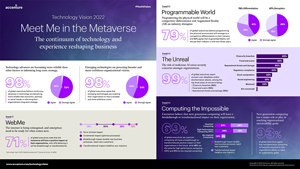 [Click on image for larger view.] Report Infographic (source: Accenture).
[Click on image for larger view.] Report Infographic (source: Accenture).
Rather than just an IT transformation, Accenture sees the coming tech-driven changes affecting much more.
"The physical world is coming alive with new capabilities, environment by environment, each with its own rules," the report says. "We already have small-scale intelligent physical worlds like smart factories, intelligent cruise ships and automated ports. Tomorrow we'll see these grow into smart neighborhoods, cities and countries, where massive digital twins mirror physical reality. And purely digital worlds are expanding as well. Major companies will have their own internal 'metaverses' to let employees work and interact from anywhere. In our free time, new consumer metaverses will transport us to almost any type of world we can imagine, to play games, socialize or relax."
Following are descriptions of the four technology trends around which the report is built, along with Accenture's "bottom line" summaries:
- WebMe: This refers to the internet envisioned as a persistent 3D environment instead of a disparate collection of sites and apps. This environment will have its own sense of place, meaning that, for example, a user could move from work to a social platform by virtually walking across a street.
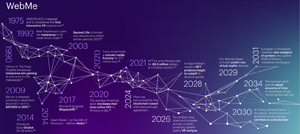 [Click on image for larger view.] WebMe (source: Accenture).
[Click on image for larger view.] WebMe (source: Accenture).
Bottom line: "Today's work on the metaverse and Web3 is creating the future of the Internet. Together, they will remove friction between the proliferation of digital platforms and reinvent the use of data across digital experiences. In the process, they are driving new lines of business, ways of working and opportunities for businesses and people to interact. The race to define, build and populate a new kind of digital world is on."
- Programmable World: This refers to today's typical software elements like control, customization and automation being integrated into the physical world where people can command -- or "program" -- things to their own liking.
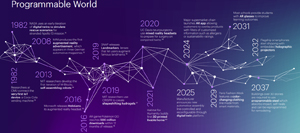 [Click on image for larger view.] Programmable World (source: Accenture).
[Click on image for larger view.] Programmable World (source: Accenture).
Bottom line: "The arrival of the programmable world will be the sharpest turning point for people and businesses in decades. We're about to live in environments that can physically transform on command, that can be customized and controlled, and that can change faster and more often than we have ever seen before."
- The Unreal: This is about machines becoming more human-like, aided by tech like AI, and a blurring of what is real or not that, for example, bad actors can take advantage of with deepfakes, malicious bots and so on.
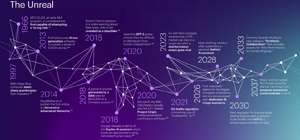 [Click on image for larger view.] The Unreal (source: Accenture).
[Click on image for larger view.] The Unreal (source: Accenture).
Bottom line: "We are already building the unreal world. But whether we make things better or fall victim to malicious actors is yet to be determined. Most likely, we will land somewhere in-between, and that's why elevating authenticity is so important. Authenticity is the compass that will guide companies to use AI in a genuine way, by considering provenance, policy, people and purpose. Only then will the full benefits of the unreal world be realized."
- Computing the Impossible: This refers to new computational abilities enabled by cutting-edge tech like quantum, biologically inspired and high-performance computers.
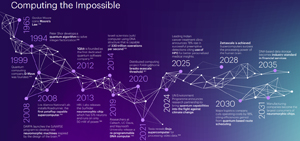 [Click on image for larger view.] Computing the Impossible (source: Accenture).
[Click on image for larger view.] Computing the Impossible (source: Accenture).
Bottom line: "For decades, computers that could efficiently solve the world's 'grand challenges' have been nothing more than theoretical. But enterprises can't afford to think about them in the abstract any longer. They are rapidly improving, and their impact on industries' most fundamental problems and parameters can either be an industry-ending event or the biggest opportunity in generations."
Here are some data highlights of the report:
- 98 percent of executives believe continuous advances in technology are becoming more reliable than economic, political, or social trends in informing their organization's long-term strategy.
- 14 percent of executives report the pandemic is continuing to disrupt their organization's business plans and operations, another 86 percent report that their organization has adapted to the disruption of the pandemic and has found a new normal.
- 71 percent orchestrate their digital strategies. of global executives state that the metaverse will have a positive impact on their organizations, with 42 percent believing it will be breakthrough or transformational.
- 95 percent of global executives believe that future digital platforms need to offer unified experiences, enabling interoperability of customers' data across different platforms and spaces.
"For decades, computers that could efficiently solve the world's 'grand challenges' have been nothing more than theoretical concepts," the report concluded. "But enterprises can't afford to think about them in the abstract any longer. They are rapidly improving, and their impact on industries' most fundamental problems and parameters can either be an industry-ending event or the biggest opportunity in generations. The ones who start rearchitecting their industry today, anticipating a future with these machines, will have the best shot at the latter."
About the Author
David Ramel is an editor and writer at Converge 360.